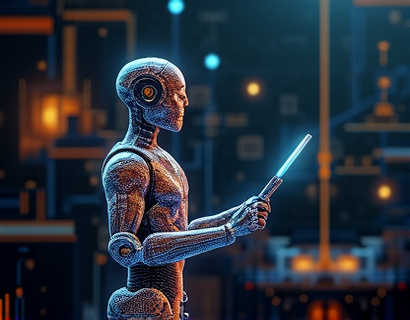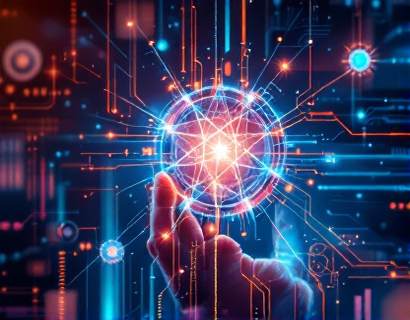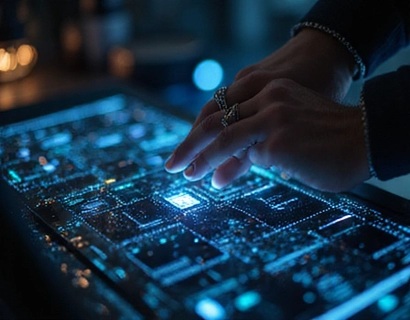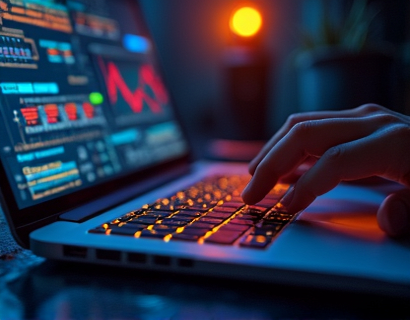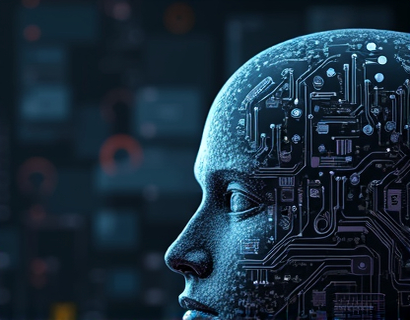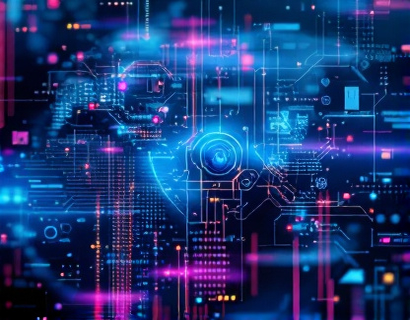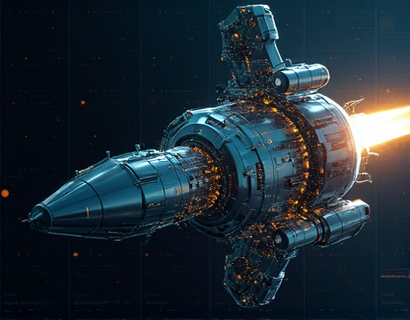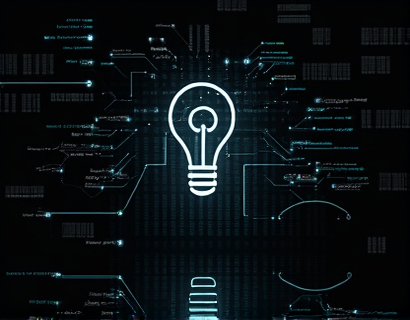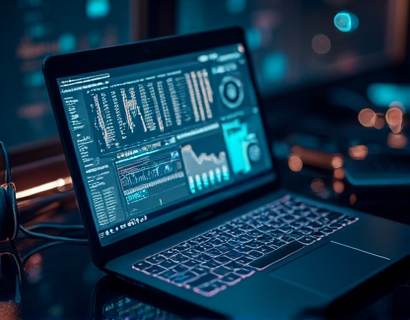AI and Crypto Synergy: Unlocking Advanced Ecosystem Solutions for Digital Innovation
The intersection of artificial intelligence (AI) and cryptocurrency is giving rise to a new era of digital innovation, where the convergence of these two cutting-edge technologies is redefining the landscape of the crypto space. This synergy is not just about combining two powerful tools but about creating a synergistic effect that enhances the capabilities of both, leading to advanced ecosystem solutions that were previously unimaginable. For tech-savvy innovators, this convergence offers powerful tools to elevate their digital experiences and explore the future of connectivity.
The integration of AI in the crypto domain is transforming how blockchain networks operate, how smart contracts function, and how digital assets are managed and traded. AI algorithms can analyze vast amounts of data from blockchain transactions, identifying patterns and insights that can optimize network performance, enhance security, and improve user experience. This article delves into the various ways AI and crypto are coming together to unlock new potentials and drive innovation in the digital world.
Enhancing Blockchain Security with AI
One of the most significant challenges in the crypto space is security. Blockchain, while inherently secure due to its decentralized nature, is not immune to threats such as 51% attacks, smart contract vulnerabilities, and phishing scams. AI can play a crucial role in fortifying blockchain security by detecting and mitigating these threats in real-time.
Machine learning models can be trained to recognize abnormal patterns in blockchain transactions, flagging potential security breaches before they occur. For instance, AI can monitor transaction volumes, user behavior, and network activity to identify anomalies that may indicate a security risk. By automating the detection process, AI reduces the response time and enhances the overall security of the blockchain network.
Moreover, AI can improve the robustness of smart contracts. By analyzing the code for vulnerabilities and predicting potential failure points, AI tools can help developers create more secure and reliable smart contracts. This not only protects the assets stored on the blockchain but also builds trust among users, encouraging wider adoption of decentralized applications (dApps).
Optimizing Blockchain Performance with AI
Blockchain networks, especially those using proof-of-work (PoW) consensus mechanisms, face scalability issues due to their energy-intensive nature and limited transaction throughput. AI can help optimize blockchain performance by predicting network congestion, optimizing resource allocation, and improving consensus mechanisms.
AI algorithms can analyze historical data to predict peak usage times and adjust network parameters accordingly, ensuring smooth operations during high-demand periods. Additionally, AI can assist in the development of more efficient consensus mechanisms by simulating different scenarios and identifying the most resource-effective solutions. For example, AI can help in the transition from PoW to more energy-efficient consensus algorithms like proof-of-stake (PoS) or delegated proof-of-stake (DPoS).
Another area where AI can enhance blockchain performance is in the management of decentralized storage solutions. By predicting storage demand and optimizing data distribution across the network, AI can improve the efficiency and reliability of decentralized storage systems, making them more viable alternatives to centralized cloud storage services.
AI-Driven Cryptocurrency Market Analysis
The crypto market is notoriously volatile, making it challenging for investors to make informed decisions. AI can provide valuable insights into market trends, helping investors navigate the complexities of cryptocurrency trading with greater confidence.
AI-powered trading platforms use natural language processing (NLP) to analyze news articles, social media posts, and other textual data to gauge market sentiment. By understanding the emotional tone behind news and social media discussions, AI can predict market movements and provide actionable trading recommendations. This sentiment analysis, combined with technical and fundamental analysis, can significantly enhance the decision-making process for traders.
Furthermore, AI can identify arbitrage opportunities by continuously monitoring multiple exchanges for price discrepancies. By executing trades across different platforms in real-time, AI-driven trading bots can capitalize on these opportunities, maximizing profits and minimizing risks. This level of automation and precision is difficult to achieve manually, making AI an indispensable tool for both individual and institutional investors.
Personalized User Experiences in the Crypto Ecosystem
The crypto ecosystem is diverse, with a wide range of applications and services catering to different user needs. AI can enhance user experiences by providing personalized recommendations and tailored services based on individual preferences and behaviors.
For instance, AI can analyze a user's transaction history, preferred cryptocurrencies, and investment goals to suggest customized portfolio strategies. By understanding the user's risk tolerance and market preferences, AI can recommend suitable assets and trading strategies, helping users achieve their financial objectives more effectively.
In the realm of decentralized finance (DeFi), AI can optimize loan and lending processes by assessing creditworthiness and determining optimal interest rates. This not only improves the user experience but also increases the efficiency and accessibility of DeFi services. AI-driven chatbots and virtual assistants can provide 24/7 support, answering user queries and guiding them through complex financial operations.
Strategic Marketing in the Crypto Space
For businesses operating in the crypto space, strategic marketing is crucial for success. AI can revolutionize marketing efforts by providing deep insights into customer behavior, optimizing campaigns, and enhancing brand engagement.
AI-powered analytics tools can process large datasets to identify customer segments with the highest potential for engagement and conversion. By understanding the demographics, interests, and online behavior of these segments, businesses can create targeted marketing campaigns that resonate with their audience. This level of precision marketing not only improves ROI but also builds a stronger connection with the target audience.
AI-driven content generation can also play a significant role in marketing. By analyzing successful content from the crypto space, AI can generate high-quality, relevant content that addresses the specific needs and interests of different user groups. This can include blog posts, social media updates, and even video scripts, ensuring a consistent and engaging brand presence across all platforms.
Moreover, AI can enhance customer service through chatbots and virtual assistants, providing instant support and resolving common issues efficiently. This not only improves customer satisfaction but also reduces the workload on human support teams, allowing them to focus on more complex tasks.
Building Decentralized Applications with AI
The development of decentralized applications (dApps) is a key area where AI and crypto converge to create innovative solutions. AI can enhance the functionality and user experience of dApps in various ways.
One significant application is in the realm of predictive analytics. dApps can leverage AI to analyze user data and predict future trends, enabling more informed decision-making. For example, a decentralized prediction market dApp can use AI to provide accurate predictions based on historical data and real-time events, attracting more users and increasing engagement.
AI can also improve the user interface and experience of dApps by personalizing the user journey. By understanding user preferences and behavior, AI can tailor the interface to individual needs, making the application more intuitive and user-friendly. This personalization can lead to higher user retention and satisfaction, crucial factors for the success of any dApp.
Another exciting application is in the development of AI-powered NFTs (non-fungible tokens). AI can create unique, dynamic NFTs that evolve over time based on user interactions or external data. These AI-generated NFTs can serve as unique digital assets with increasing value and appeal, opening new avenues for artists, creators, and collectors in the crypto space.
Challenges and Considerations
While the synergy between AI and crypto offers immense potential, it also comes with its own set of challenges and considerations. One of the primary concerns is the regulatory landscape. As both AI and crypto operate in areas with evolving regulations, businesses must navigate a complex legal environment to ensure compliance.
Another challenge is the technical integration of AI into existing blockchain infrastructure. Not all blockchain platforms are equally compatible with AI technologies, and integrating these systems requires expertise and resources. Additionally, the computational requirements of AI can strain blockchain networks, especially those with limited scalability.
Privacy is another critical issue. AI's reliance on data raises concerns about user privacy and data security. It is essential to implement robust privacy-preserving techniques, such as differential privacy and homomorphic encryption, to protect user data while leveraging AI's capabilities.
Future Prospects
The future of AI and crypto synergy is promising, with ongoing advancements in both fields paving the way for even more innovative solutions. As AI algorithms become more sophisticated and blockchain technology matures, the potential for collaboration will only grow.
One exciting area to watch is the development of AI-driven decentralized autonomous organizations (DAOs). These organizations can leverage AI to make collective decision-making more efficient and transparent, enhancing the governance of decentralized projects. AI can analyze member preferences, predict outcomes, and optimize resource allocation, making DAOs more effective and resilient.
Another frontier is the integration of AI with emerging blockchain technologies like quantum computing. While quantum computing poses a threat to current cryptographic algorithms, it also offers opportunities for developing new, more secure encryption methods. AI can play a pivotal role in this transition, helping to design and implement quantum-resistant cryptographic solutions.
In conclusion, the convergence of AI and crypto is unlocking advanced ecosystem solutions that are transforming the digital landscape. By enhancing security, optimizing performance, providing personalized experiences, and revolutionizing marketing, this synergy is driving innovation and opening new possibilities for tech-savvy innovators. As the crypto and AI communities continue to collaborate, the future holds endless potential for groundbreaking developments that will shape the next generation of digital ecosystems.




